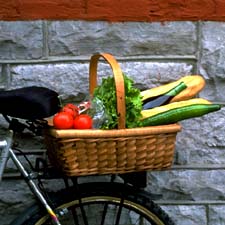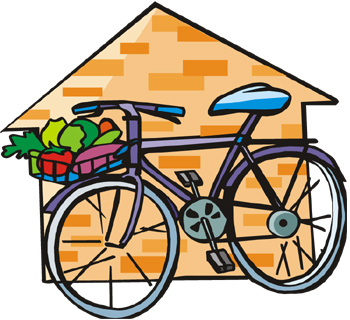| Eating Smarter and Biking Better |

SEACOAST BY BIKE
Sometimes it is easier to remove bad habits if you have an endgame. In order to bike better, cyclist Dave Balkin had to eat better. What he learned while facing up to his habits and educating himself has value whether you exercise on wheels, on foot or simply watch people exercise on TV.
ABOUT the Great Balkini
Despite trillions of words published on diet and exercise most of us have not been motivated into a higher state of food consciousness.
Consciousness raising is a tough sell because the follow-up – actively changing your lifestyle -- is tedious and lousy with discipline. Alice Waters began the "Delicious Revolution". Her formula for educating Americans about taste, health and nutrition sounds too good to be true -- and it is. Despite its sublime simplicity, actually implementing her principles in an age of fast and processed food is bothersome work for athletes and couch potatoes alike. The bad food is everywhere – easy to get and hard to resist.
I’ve been studying up on nutrition in order to improve my cycling. My personal Cliff Notes on the topic, so far, are as follows:
Step 1: Eat Less.
Step 2: Eat only fresh, unprocessed food chosen from all groups.
If we all became suddenly healthy would the fall of the junk food industry topple the American economy? Who cares? The Declaration itself says you have the right to life, liberty and the pursuit of healthiness.
Civilization, for all its amenities, hasn’t altered our hunting and gathering instinct, but it has sure made things easier. Forget sustenance, excess is the new benchmark for success. That’s great for your bank account, but food is egalitarian; its quality dictates our health, and calories consumed vs. calories burned are ultimately the measure of us all.
As recreational athletes we already have half of the diet-exercise formula in play. It must be way easier to get people we enjoy vigorous exercise to eat better than it is to get people in poor physical condition to exercise – right?
I Was What I Ate
For those like me who live to eat, hard exercise is a godsend. Living in Miami years ago I reveled in a glorious decade of year-round bike riding and automatic weight control. Cuban food was dirt cheap and irresistibly healthy. Platefuls of black beans, rice, yucca, plantains and fish or meat along with an incredible variety of tree ripened tropical fruits were the perfect fuel to burn during hours of flatland riding. Midway through my long daily ride I could pick ripe star fruit off the trees.
Now I’m on automatic weight gain in Maine. In winter, even eating less, I still put on 10 pounds because I ride the bike slower and 75% less. I crave exercise, but walking and gym time don’t begin to make up for daily riding with faster people.
Like most Yankees, my weight rises and falls with the season. I know that gaining and losing weight is not the best idea, but at least by eating wholesome foods, my body stores fewer harmful chemicals in my fatty winter tissue. Come summer. I admit, I enjoy watching and feeling the pounds melt off.
I’m lucky to be older than most of you because, in my childhood, we were forced to eat real food. There were no fast food restaurants or vending machines at school. Candy and soda were rare treats and our family almost never dined out. For years my mother cooked breakfast, made school lunch for four kids and we were required to attend a sit-down dinner every night. Everything was made from scratch. We kids had to help. I ate a lot of real food and the habit stuck.
There was a downside. We had to eat everything on our plates before we could be excused from the table. Choking down weird vegetables and watery fish builds tolerance if not exactly character. Listening with a straight face to a stern lecture that someday haddock would cost more than steak and I’d like it better was so absurd it invariably brought on the giggles and banishment unless everyone else joined in.
Now at restaurants I never order steak and invariably order haddock. Truth is even as a kid I got used to eating fish and some of the veggies weren’t half bad. Admit it to my parents? Never. They’d just pile more on the plate. But this anecdote goes to prove tastes change. It’s never too late to begin the cycle of healthier eating.
Eating is no longer about survival. It’s a mind game, and games take practice to play well. Here are a few tips that work for me, and may work for you.
Continue with NUTRITION FOR CYCLERS
NUTRITION FOR RECREATIONAL RIDERS

Eat Your Broccoli
In the supermarket shop only the refrigerated perimeter. Pick only the produce that looks good. Broccoli crowns are always a good choice. They’re already trimmed and as easy as fast food. Cut into flowerets, wash and drop in boiling water for 4 minutes. Rinse in cold water for a healthy dose of nutrients to any meal.
Don’t like broccoli? There are a host of vegetables that can be prepared the same way, or even microwaved, and then used later hot or cold. Cold veggies as well as freshly made or leftover pasta or mashed potatoes are good in salads ,especially for people who aren’t really wild about greenery.
Get artsy and take a few moments to arrange something pretty. At the very least it’ll please one of your senses. Add a little protein like nuts, cheese, shrimp or chicken, or some carbs and if you must slather it all in a favorite dressing. Be cool with the dressing later, your palate needs time to accept new flavors and textures.
Forced or properly motivated, you can get used to anything. Organic food makes long term health sense. I find it hard to pay more for fewer choices, especially when the results may never be apparent. But organic is clearly the way to go with meat since the fat in conventionally raised animals is a storehouse for nasty chemicals.
Yes, we all get a dose of mercury when eating seafood, but it’s high on my list anyway. Heck I used to play with balls of mercury in high school chemistry. It turned silver dimes super slick and shiny and then black. Fun for the feeble minded. Who knew?
Chemical residues are especially high in dairy fats and something to be wary of. I always buy organic dairy product and use much less than I used to before I got smarter (and older). The benefit more than makes up for the extra cost.
Intellect rules. I simply refuse to put my body through an avoidable chemical workout. The more you think about what goes in your mouth, the more appealing nutritious raw foods become. I’ve learned to replace ice cream with sorbet. Growing up I drank 3-5 quarts of milk daily. I can honestly say I’ve had my fill. I still enjoy cheese, but eat much less when I think of it as flavored butter.
For the recreational cyclist, food is the second half of any good healthy ride. Eating well requires the same discipline as the ride itself, and just like an exercise routine -- it takes time to get a handle on. So start small, be kind to yourself, and grow into the food routine.
Eating well is the single best thing you can do for yourself. Once that fact sinks in – and for some of us it takes years -- better food choices are sure to follow. I find that good nutrition evolves out of knowledge. It becomes less about what you eat, and more about what your intellect will no longer allow. When knowing better finally gains the upper hand, you are riding high.
Copyright © 2006 by David Balkin. All rights reserved.
